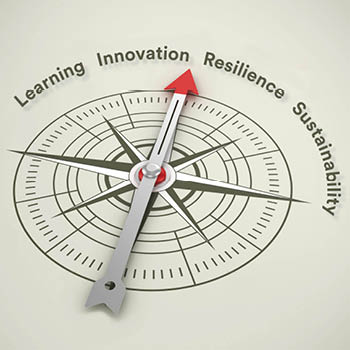End October 2019, the Faculty of Management Science and Technology organized the second edition of the international symposium Learning and Innovation in Resilient Systems (LIRS). The second edition reiterated the success of the first symposium organized in 2017, attracting over one hundred participants from the whole of Europe and beyond.
The conference created a platform for discussing multi-disciplinary research aimed at tackling a wide variety of topics including learning, innovation and resilience in organizational sustainability, institutional innovation, supply chains, socio-ecological systems, teaching, and societal challenges and circular economy.
Audience engaged by keynote speakers
The four invited keynote speakers engaged the audience in debates on a variety of topics. Jan Jonker shared his views on ‘resilience’, stating that a resilient system should always be in transition. Mark Reed discussed public-private partnership for resilient agro-ecosystems, showing how research can contribute to building complex business cases for ecosystem conservation. Wil van der Aalst shared his work on process mining, giving plenty of examples of how this research field, situated between data mining and process modeling, can contribute to enhancing business processes. Roman Beck described the (lack of) European initiative in setting up a block chain backbone, sketched the possibilities of such a system and warned about the progress China already made with this.
Plenary discussion focuses on multidisciplinary research
The plenary discussion in the final session of the conference revolved around multidisciplinary research, the experience that was built doing multidisciplinary research within the program LIRS for the past five years, and what lessons can be taken into the future. The fact that most academic journals have a monodisciplinary focus was mentioned as a major barrier to publishing multidisciplinary research. PhD candidates noticed that it takes extra time to gain familiarity with multiple research fields, while supervisors from multiple disciplines need to take the time to learn to understand each other’s jargon. Regardless, the department had gained mostly positive experiences doing multidisciplinary research and there was plenty of enthusiasm to keep building multidisciplinary competences going forward.
One of the ideas brought into the discussion was to promote multidisciplinary master theses, giving master students supervisors from multiple disciplines. Reviewing papers from colleagues from another discipline pre-publishing could also work to enhance cross-discipline cooperation. It was clear that there is still much to learn and experiment with, expanding the multidisciplinary research competencies gained in the LIRS research program so far.
The relevance of multi-disciplinary research
Overall the symposium stressed the relevance of multi-disciplinary research programs in dealing with some of the most important modern global challenges like: new IT technologies and digital security, environmental sustainability, new business processes and organizational forms in a globalized context.

